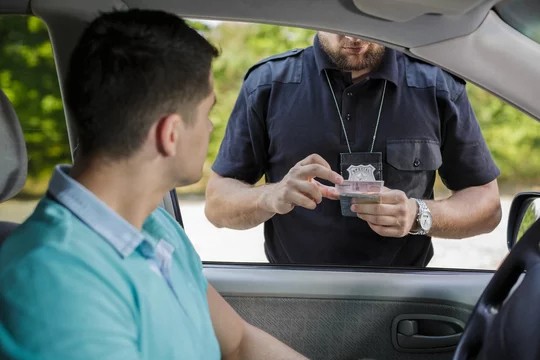A police officer stops you and demands your ID. Do you have to comply? If you refuse, can they arrest you? Many Utah residents assume they must obey every command, but the truth is that officers sometimes overstate their authority, relying on fear and confusion to gain compliance. If you don’t understand Utah’s Stop and Identify laws, you could find yourself in handcuffs—even when you’ve done nothing wrong.
At Levitt Legal, we fight back against unlawful detentions, protecting your rights and ensuring that police do not exceed their legal limits. Knowing how to respond in these situations is critical—because what you say and do in the moment can determine whether you walk away or face unnecessary legal trouble.
Key Takeaways
- Utah law does not always require you to show ID to police—officers must have reasonable suspicion of a crime before demanding identification. Passengers in a vehicle are not automatically required to comply.
- Police may use intimidation or misleading language to pressure you into compliance, even when you have the legal right to refuse. Understanding your rights is the only way to protect yourself from unlawful detention.
- Levitt Legal fights back against wrongful detentions and illegal searches, ensuring that law enforcement does not exceed its authority. If you’ve been unlawfully stopped or arrested, legal representation is crucial to defending your rights.

Understanding Utah’s Stop and Identify Law
Utah’s Stop and Identify law does not give police the blanket authority to demand identification whenever they choose. There are strict legal conditions that must be met before you are required to identify yourself.
Key Facts You Need to Know:
- You are only required to identify yourself in specific circumstances.
- Passengers in a vehicle are not automatically required to show ID.
- If police do not have reasonable suspicion of a crime, they cannot demand identification.
Understanding these boundaries is essential to protecting yourself from unlawful police action. Officers often rely on uncertainty and intimidation to coerce compliance, but you are under no obligation to provide ID unless the law explicitly requires it. In Utah, the law requires that a person must provide their name if a police officer has reasonable suspicion that the person is involved in criminal activity. This means that the officer must have a specific and articulable reason to believe that a crime has been, is being, or is about to be committed, and that the individual in question is involved in that crime. It’s important to know that simply being in a certain area or looking “suspicious” is not enough for an officer to demand identification.
The law also outlines what constitutes reasonable suspicion of criminal offense, which is a lower standard than probable cause. Reasonable suspicion under criminal law must be based on factual evidence and cannot be merely a hunch. For instance, if an officer observes someone looking into car windows late at night in a parking lot known for recent vehicle break-ins, this may constitute reasonable suspicion. Utah residents must understand that they are not legally required to carry identification at all times. However, if you are driving, you are required to have your driver’s license with you. This distinction is crucial for interactions with law enforcement, especially in situations where police officers may attempt to overstep their legal boundaries.
Moreover, if you choose to exercise your right to remain silent and refuse to provide identification when not legally required, to practice law alone, it is advisable to communicate your intentions clearly and respectfully. You can state that you do not wish to provide identification and ask if you are free to leave. If the officer insists on detaining you without reasonable suspicion, it is important to remain calm and not resist, as this could escalate the situation. Instead, comply with the officer’s instructions while making a mental note of the details of the encounter, which could be useful if you need to contest the detention later.
Knowing your rights under Utah’s Stop and Identify law empowers you to protect yourself from potential legal issues. By understanding when you are legally required to provide identification and how to assert your rights effectively, you can navigate interactions with law enforcement more confidently and avoid unnecessary legal complications.
How Officers Might Misuse the Law to Detain You
Even when the law does not support a police demand for identification, officers may still attempt to manipulate the situation. If you don’t recognize these tactics, you may unknowingly surrender your rights.
Common Police Tactics Used to Pressure You:
- Using vague language to make you believe you must comply. Officers may phrase demands as if they are legal requirements, even when they are not. This can include statements like “I need to see your ID” without providing a valid reason, creating a false sense of obligation.
- Escalating the situation to justify an arrest. If you hesitate or assert your rights, an officer may become more aggressive in an attempt to make you seem uncooperative. This can involve raising their voice, calling for backup, or threatening arrest to intimidate you into compliance.
- Asking unnecessary questions to extract information. Many people unknowingly incriminate themselves by answering seemingly harmless questions, not realizing that they were not legally required to respond. Questions like “Where are you coming from?” or “What are you doing here?” can be used to gather information that may be used against you later.
- Creating a sense of urgency or emergency to pressure compliance. Officers might suggest that immediate action is necessary, implying that refusal to comply could lead to severe consequences, even when this is not the case.
- Presenting themselves as friendly or sympathetic to lower your guard. By appearing understanding or concerned, an officer may encourage you to share information voluntarily, which could later be used against you.
The only way to protect yourself is to understand your rights and assert them. You do not have to answer every question, and you do not have to provide ID unless the law requires it. If police cannot provide a valid reason for demanding identification, you have the right to refuse. Always remember to stay calm, be polite, and clearly state your intention to exercise your rights. If you feel pressured or unsure, you can ask if you are being detained or if you are free to leave. Documenting the encounter, such as noting badge numbers or recording the interaction if legally permissible, can also be beneficial if you need to contest the situation later. Understanding these tactics and your rights under the law can help you navigate encounters with law enforcement more confidently and avoid unnecessary legal complications.
How Levitt Legal Advocates for Your Rights
At Levitt Legal, we hold law enforcement accountable when they overstep their authority. We understand how to challenge wrongful detentions, illegal searches, and police misconduct—and we fight in the legal system to ensure our clients’ constitutional rights are upheld.
How We Defend You:
- We contest wrongful detentions. If police detained you without legal justification, we fight to have the charges dismissed. Our experienced attorneys meticulously examine the circumstances surrounding your detention, gathering evidence and witness testimonies to build a robust defense strategy.
- We challenge illegal searches. If law enforcement obtained evidence through an unlawful stop, we work to have it suppressed in court. Our legal team is well-versed in the intricacies of search and seizure laws, ensuring that any evidence gathered in violation of your rights is excluded from your case.
- We educate you on your rights. Knowing when and how to assert your rights could mean the difference between walking away and facing criminal charges. We provide detailed consultations and resources to empower you with the knowledge necessary to navigate interactions with law enforcement confidently.
Moreover, we offer comprehensive legal support beyond immediate criminal defense attorney needs. Our firm provides ongoing legal advice and representation, assisting clients in understanding the broader implications of their cases and exploring all available legal avenues. We are committed to delivering exceptional legal representation, ensuring that every criminal attorney client receives personalized attention and a tailored defense strategy designed to achieve the best possible outcome.
Law enforcement does not have unlimited power—but they depend on the fact that most people don’t know the law. At Levitt Legal, we refuse to let officers exploit confusion or intimidation to violate your rights. We are dedicated to aggressively pursuing criminal cases, the criminal investigation, defending your constitutional rights, and holding law enforcement accountable for any abuse of power.

Don’t Be a Victim of Unlawful Police Tactics—Call Levitt Legal Now
If you have been detained, searched, or arrested because an officer claimed you were required to identify yourself, you need legal representation immediately. Levitt Legal is a law firm committed to defending your rights and ensuring that you are not unjustly penalized for asserting them.
Do not assume the police were acting within the law—make sure you have a legal team that will fight back. Contact Levitt Legal today for a free consultation with a criminal lawyer and let us help you with the legal process and protect your rights before it’s too late.
Frequently Asked Questions
Do I have to show my ID if a police officer asks for it?
No, Utah law only requires you to provide identification if police have reasonable suspicion that you are involved in a crime. If there is no valid reason for the stop, you are not legally required to show your ID.
Can passengers in a car be forced to show ID?
Not necessarily. While the driver must provide a license upon request, passengers are not automatically required to identify themselves unless police have reasonable suspicion that they are involved in a crime.
What happens if I refuse to show my ID?
If an officer has reasonable suspicion and you refuse to identify yourself, you could be detained or arrested. However, if there is no legal basis for the request, refusing to provide ID should not result in criminal charges.
Can police search me if I don’t show my ID?
No. Simply refusing to provide identification does not give law school or police the right to search your person, vehicle, or belongings. A search requires probable cause, consent, or a valid warrant.
What should I do if I believe I was unlawfully detained or arrested?
Remain calm, avoid resisting, and contact Levitt Legal immediately. We will review your case, challenge any unlawful police actions, do the best criminal defense attorneys can, and work to get charges dismissed or evidence suppressed if your rights were violated.
Can I record my interaction with the police?
Yes, in Utah, you have the right to record your interaction with the police as long as you are in a public place and the recording does not interfere with the police officer’s duties. This right is protected under the First Amendment of the U.S. Constitution, and it applies even if the officer does not consent to being recorded. However, it is important to remain respectful and follow any lawful orders given by the officer.
